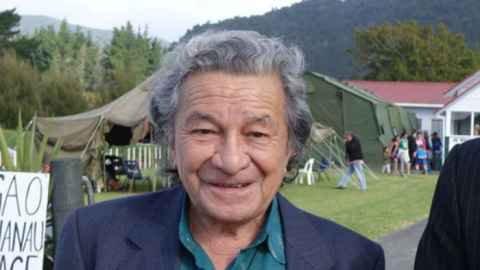The linguistic luminary, Sir Patu Hōhepa's legacy
25 September 2023
Prominent Te Ao Māori leader leaves a legacy of strengthening te reo Māori and raising the profile of Aotearoa New Zealand.

Kua pari rā a Hokianga-nui-a-Kupe, a Hokianga Whakapau Karakia ki te ngarunui, te ngaruroa, te ngarupaewhenua, ngā ngaru i mau mai ai a Ngātokimatawhaorua.
Kua ngaua ngā tahataha o te awa o Waimā e ngā tai kawe roimata, kua huihuimai ngā kapua pōuri ki runga ki te raorao o Waimā, i te hinganga o tēnei, rangatira, aporei, mārohirohi, a Tā Patu Hohepa, kua nagro nei i tea o nei.
The riverbanks of the Waimā River are met with tides of lamentation, while the clouds of sadness gather over the Waimā Valley, marking the loss of this great chief, Sir Patu who has left this world, for the next.
Retired professor of Māori language and renowned Māori scholar Sir Patrick (Patu) Hōhepa (Te Mahurehure, Ngāpuhi, Te Ātiawa) has died at his home in Waimā, Hokianga aged 87.
Sir Patu is remembered as one of Māoridom’s foremost linguists whose leadership and advocacy for Māori cultural recognition and development raised the profile of Māori culture in Aotearoa New Zealand.
He was awarded the Knight Companion of the New Zealand Order of Merit for services to Māori culture and education in 2022, recognising him as a renowned teacher and scholar of te reo Māori and other Pacific languages and as a leader in the ‘Māori renaissance’.
Sir Patu was the first to advocate for a marae at the University, where he studied social anthropology before pursuing his masters degree, writing a thesis titled: 'A Māori Community in Northland'. He later gained his PhD in sociolinguistics from Indiana University.
Hōhepa also taught at the University of Hawai'i, Massachusetts Institute of Technology and Harvard, but for many years served as a Professor of Māori Studies at his alma mater, the University of Auckland.
In 1973 he was recruited by then Māori affairs minister Matiu Rata as a senior adviser to assist in a programme of transformation that included reforming the Māori Affairs Act, laying the foundation for reform of Māori land law and creating the Waitangi Tribunal to review breaches of the Treaty of Waitangi.
In the 1980s he wrote a report for the government on the establishment of the Waitangi Tribunal, and repeal of the Māori Affairs Act and from 1997 to 2007, he served as the Commissioner of the Māori Language Commission, heavily promoting Te Reo Māori and developing proficiency testing.
Sir Patu served as a member of Te Waka Toi, the Māori Board of Creative New Zealand from 2004 and 2008 and has been a kaumātua for a large number of organisations, including as a member of Haerewa, the Māori Cultural Advisory Group of Auckland Art Gallery.
As part of this role, he led the New Zealand delegation accompanying an exhibition of 50 portraits of Māori by pre-eminent painter Gottfried Lindauer to Europe in late 2014.
Former colleague and Professor of Māori Studies, Margaret Mutu, describes Hōhepa as "brilliant".
"I was one of his students in the 1970s and then also a colleaugue from the 1980s."
“Sir Patu Hōhepa was a brilliant linguist, teacher and mentor who shared his immense knowledge of Te Ao Māori freely and generously,” she said.
“He fought for Māori rights with a deep understanding of the guarantees and constitutional power of He Whakaputanga o te Rangatiratanga o Niu Tireni (1835) and Te Tiriti o Waitangi (1840).”
Mate i te, mate i te wā. Mate i ngā marae maha. Mate i te pō, tīkina, tangihia.
Kāti rā, e kara e Tā Patu, mūrau a te tini, te wenerau a te mano, haere ki ō tupuna.
Media contact
Te Rina Triponel | Kaitohutohu Pāpāho Māori
E: te.rina.triponel@auckland.ac.nz